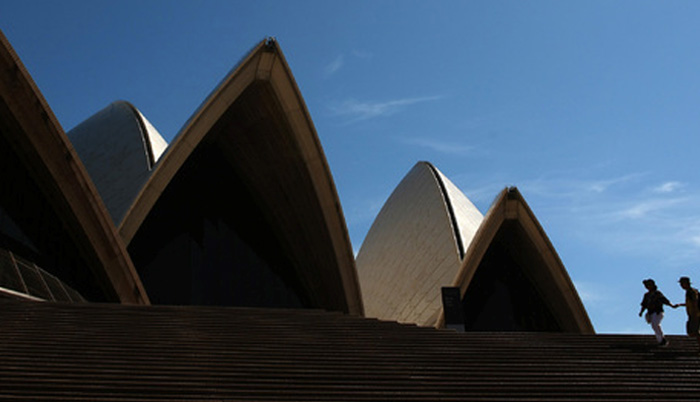![]() Home > World Business
Home > World Business
The 10,000-Mile Journey To Short Australia

![]() February 23rd, 2017 | 07:22 AM |
February 23rd, 2017 | 07:22 AM | ![]() 1239 views
1239 views
AUSTRALIA
Soren Aandahl has never traveled so far in search of a stock to short.
The co-founder of Glaucus Research Group flew more than 10,000 miles (16,090 kilometers) from his base in Austin, Texas, to Australia, where he’s looking at companies including commodity producers. He’s not the only one. From his new firm in London, former Goldman Sachs Group Inc. derivatives trader Ismail Guennouni chose Westpac Banking Corp. -- one of Australia’s largest companies -- as his next big short.
For the first time, both are targeting shares in Australia’s $1.3 trillion equity market, where average short-selling levels are already double those in Hong Kong. Aandahl turned his attention to the country as part of a broader expansion that includes a foray into Japan last year, while Guennouni is convinced Australia’s giant lenders will be decimated by stricter regulations. One prominent local investor is far from surprised at their arrival.
“The perception from foreigners is that the market is a little dopey and that the corporate regulator is a little soft,” said John Hempton, the founder of Bronte Capital Management Pty, a long-short hedge fund in Sydney. “You do find frauds here. They make obvious targets.”
Australia’s securities regulator says short-side analysts are entitled to their views and targeted firms should respond to their allegations in full. It also said it monitors short-side research.
“We encourage companies to publicly address the concerns raised,” said Greg Yanco, Sydney-based senior executive leader for market supervision at the Australian Securities & Investments Commission.
For Aandahl, who made his name covering Chinese companies listed in the U.S., the move is the next step after targeting its first Japan short in July. The 36-year-old director of research at Glaucus, who says his team spends as much as 700 hours researching one idea, is also active in Hong Kong, where he tends to highlight stocks he expects to lose most or all of their value.
Glaucus plans to publish a report on at least one Australian company this month or early next month, Aandahl said, declining to identify the targets. He said shorting the country’s banks wouldn’t be attractive.
“If you look at our track record, for the most part we are industry agnostic,” he said in an interview in Melbourne on Feb. 3. “We short follies, frauds and fads -- that’s what we look for.”
In April 2012, Universal Travel Group voluntarily delisted from the U.S. stock market, a year after Glaucus issued a report questioning the Shenzhen-based company’s financial statements and advising investors sell the stock. In 2013 UTG settled a lawsuit with the U.S. Securities and Exchange Commission. More recent successful bets include Tech Pro Technology Development Ltd., whose shares fell 86 percent in one day after Glaucus questioned the company’s accounting. Tech Pro vigorously denied the claims in the report.
Aandahl’s foray into Japan has been tough. Itochu Corp., a trading company, has risen about 30 percent since Glaucus issued a “strong sell” rating. Itochu strongly denied the criticisms of its accounting.
Westpac Short
Guennouni, also 36, set up Meridian Investment Management Advisory Ltd. last year to make long and short bets on stocks. After starting his career at Goldman Sachs helping companies to manage risk using derivatives, he moved to Boussard & Gavaudan Asset Management in 2007 and rose to partner at the hedge fund. From 2012 he worked for Occitan Capital Partners designing options strategies.
One of Guennouni’s first shorts at Meridian is Westpac. Australian lenders stand to suffer more than global peers as expected changes to regulations on risk-weighted assets dampen profitability, Guennouni wrote in a 46-page short report published last month. The trade doesn’t depend on a hard landing in China or a commodities rout, he wrote. Shares of Westpac, which he sees as the lender most exposed to this risk, may fall from 30 percent to 50 percent, he said, without specifying a time frame. Westpac declined to comment.
Widow Maker
Betting against Australian banks has been so unsuccessful that the trade has been nicknamed the “widow maker." Expectations for a local housing-market crash or a sharp deceleration in China’s economy have failed to materialize for bearish investors waiting for lenders’ stock prices to slump.
“Most people have been shorting Australian banks as a part of a macro short on China and the economies linked to it,” Guennouni said. Ours is “a bottom-up trade, not macro-driven.”
Short interest for companies in Australia’s S&P/ASX 200 Index on average accounts for 3.7 percent of the free float, compared with 1.8 percent for stocks on Hong Kong’s Hang Seng Index, according to IHS Markit data. That’s also higher than the 2.1 percent on Japan’s Nikkei 225 Stock Average and 2.7 percent for the S&P 500 Index in the U.S.
For Chad Slater, co-founder of Morphic Asset Management Pty, Australia “is one of the best places in the world to short -- hands down.” It doesn’t have transaction taxes like in the U.K. and Taiwan, and it’s easy to find stocks to borrow, he said, a crucial part of the short-selling process. “It ticks every box,” he said.
Despite targeting companies in Australia for the first time, neither Aandahl nor Guennouni see broader issues with the market itself.
“We are not finding the droves of what we think are really material misrepresentations, or really rotten companies,” Aandahl said. “We think there are a couple of rotten apples.”
Source:
courtesy of BLOOMBERG
by Adam Haigh and David Stringer
If you have any stories or news that you would like to share with the global online community, please feel free to share it with us by contacting us directly at [email protected]